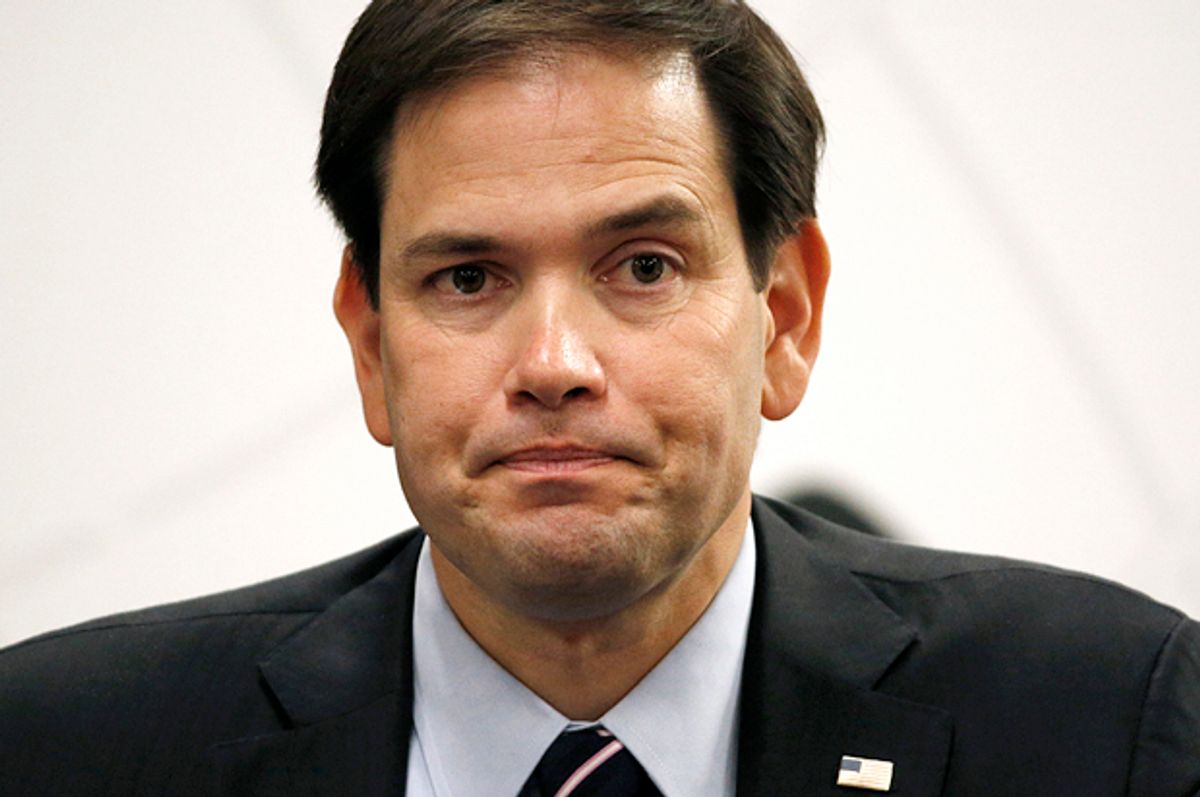It’s Rubio time! With Scott Walker flaming out and the rest of the establishment candidates fizzling after a summer futilely spent trying to derail Donald Trump, Marco Rubio is emerging as the hot new favorite for the Republican nomination by virtue of attrition. He’s made a name for himself as the candidate of basic political competence in a field of clowns, bigoted clowns, has-been clowns, and the guy named Bush, which isn’t the worst thing in the world, even if it is a low bar to clear. But renewed focus on the Rubio candidacy means that his strategy of staying out the headlines while others self-destruct will have to change. He’ll have to start answering questions and taking positions as the Republican establishment casts about for a candidate to line up behind.
And that’s where things get dicey. Rubio actually shares a number of weaknesses that plagued Walker – he’s a lifelong politician running in an extremely anti-establishment political environment; and the base of the party doesn’t trust him on certain issues, like immigration.
Rubio made enemies on the right in 2013 when he joined Democrats and a small group of Republicans in helping to pass a comprehensive immigration reform bill in the Senate. The legislation died a slow, tortured death as conservatives in the House of Representatives refused to allow any action on “amnesty,” and Rubio – sensing which way the political wind was blowing – moved to distance himself from his own bill, eventually disavowing it altogether. Rubio was so desperate to regain favor with conservatives that he actually started rewriting history and presenting himself as a sadly prescient critic of the legislation he shepherded through the Senate and voted for.
He’s completely abandoned his support for comprehensive reform and now subscribes to the much more conservative-friendly position that the border must be thoroughly and completely secured before any talk of further reforms can start. As Bloomberg’s Sahil Kapur writes, Rubio was pressed on the “what comes after border security” part of his policy by Sean Hannity the other day, and Rubio punted the citizenship question so far down the field that he, as president, would never deal with it:
Pressed by conservative host Sean Hannity during a Monday night interview on Fox News, the Florida senator said he's open to a path to citizenship for people in the U.S. illegally, but only a decade or more after passage of bills to secure the border and modernize the legal immigration system.
"I don't think it's a decision you have to make on the front end. The first two things you have to do is stop illegal immigration, then second you have to modernize our legal immigration system, and then third you can have a debate about how to even legalize people to begin with," Rubio said. "And then ultimately in 10 or 12 years you could have a broader debate about how has this worked out and should we allow some of them to apply for green cards and eventually citizenship."
Quite a profile in courage we’re seeing here. The senator who risked his political reputation to pass a bill that would put a pathway to citizenship in place is now boasting of border security and passing off the (politically hazardous) question of citizenship to the person who would succeed him in the office he hasn’t won yet. He’s communicating to the conservative base that no undocumented immigrants will receive “amnesty” on his watch. Whether they’ll believe him given his past apostasy is an open question, but it’s sure to alienate Hispanic voters, who Republicans will need to vote for them in unprecedentedly large numbers to have a chance at winning the White House.
Rubio’s answer here is an excellent example of why Democrats, liberals, and immigration activists are so distrustful of Republicans when it comes to their “border security first” immigration stance. The hardline conservatives within the party who dominate the immigration agenda don’t want anything except border security and will move to block any legislation that goes beyond fence building and border militarization. The comprehensive approach was meant to avoid this pitfall by providing for border security but also building in specific triggers for moving forward with reforms to the immigration system and legal status for immigrants already in the country. Rubio used to believe this was a reasonable approach to reform before conservatives sabotaged him, and he’s spent the time since then tacking steadily rightward to make amends.
This is why the Rubio ascendance merits some real skepticism. He’s not the incompetent bumbler that Walker was, but he’s being forced to take some extremely conservative positions to overcome the distrust of the Republican base, and that will be a real problem for him in the general election if he wins the nomination.



Shares